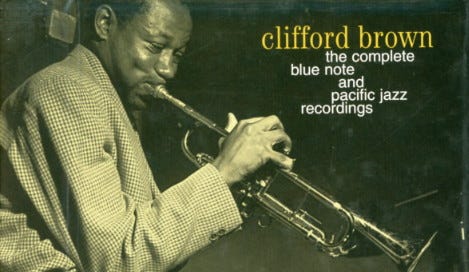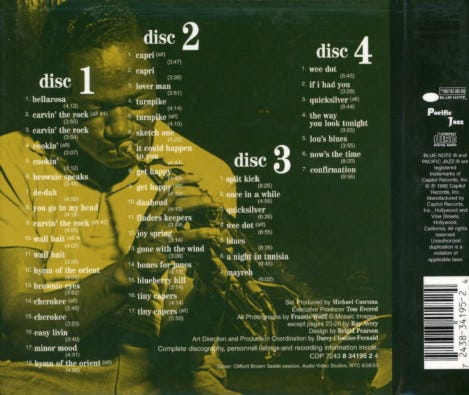Clifford Brown: The Complete Blue Note and Pacific Jazz Recordings
© Copyright ® Steven Cerra. All rights reserved.
“Brown was one of the outstanding jazz trumpeters of the 1950s, and his reputation as an extraordinary improviser endures. His playing reflected a synthesis of certain stylistic aspects of Gillespie, Miles Davis, and Navarro; it was characterized by a rich, broad tone and a percussive attack, unusually long yet carefully shaped phrases, exceptional virtuosity, and a seemingly unending flow of logically developed musical ideas. The brilliantly impeccable technique he displayed in solos at fast tempos, which were projected with equal fluidity from the highest to the lowest register of his instrument, was complemented by the haunting, introspective lyricism that distinguished his performances of ballads. His most mature work was with the Brown-Roach Quintet, as reflected in the albums Study in Brown and At Basin Street. Brown's style exerted a pervasive influence on jazz improvisation in the 1960s and 1970s, and represented an alternative approach to the subdued manner of Miles Davis. This influence may be seen most directly in the work of Lee Morgan and Freddie Hubbard.”
Olly Wilson in Barry Kernfeld, ed., The New Grove Dictionary of Jazz
While other figures of the bop era had drugs as their tragedy, It was left to a car accident to terminate Brown's wonderful contribution to jazz, a cruelty which more than half-century later still seems devastating.
What Brown did was sew together the best qualities of the bop players who had preceded him -Gillespie's full-tilt ebullience, Navarro's big
sound, Miles Davis's melodious appeal - and intensify them, in one forthright style. He could get all over the horn with incomparable fluency, his high range as easily covered as his middle and low, but this was amplified by his voluptuous sound and vibrato and the joyful assurance he seemed able to switch on without any warming-up passages. As a ballad player he might have been the best the trumpet could muster at that time, making even the promising Davis seem like a beginner, and EmArcy recorded him with strings and as an accompanist to Sarah Vaughan. Following his work through - luckily, he was extensively set down both in the studios and in live recordings in his brief heyday - he seems to get better and better as he goes on, his later live recordings almost unbelievably skilled and exciting. The final icing was his composing, which again had the marks of natural greatness: 'Joy Spring', 'Daahoud', 'Blues Walk' and others have the easy stride of a writer who had music spilling out of him. But it all came to an abrupt end in June 1956, in a crash on a rainy Pennsylvania night, which also killed pianist Richie Powell and robbed jazz of one of its golden princes. Who can tell what he might have gone on to achieve?
Richard Cook’s Jazz Encyclopedia
The recordings on this four CD set have always been among my favorite Brownie albums especially because they reflect his ability to play in any context - from the steamin’ straight-ahead Bop inspired music found on the early Blue Notes to the compositionally focused and multi horn arrangements based on his original tunes put together by tenor saxophonist Jack Montrose and performed by Clifford with other West Coast Jazz stalwarts.
But as the opening paragraph from Michael Cuscuna’s notes to Clifford Brown: The Complete Blue Note and Pacific Jazz Recordings [CDP 7243 8 34195 2 4] underscores, given the ridiculous brevity of his career and the magnificence of his music, everything by Brownie is of value.
“It was just four years. One presidential term. The interval between Olympic contests. No time at all. Virtually everything we know about trumpeter Clifford Brown — who at age 26 was killed on the Pennsylvania Turnpike, in an accident that also claimed the life of pianist Richie Powell — comes from what he recorded in one incredibly narrow four-year window.
Keep reading with a 7-day free trial
Subscribe to CerraJazz Substack to keep reading this post and get 7 days of free access to the full post archives.





